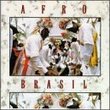| All Artists: Gilberto Gil Title: Parabolicamara Members Wishing: 1 Total Copies: 0 Label: Wea/Warner Release Date: 3/14/2006 Album Type: Import Genres: International Music, Latin Music Styles: South & Central America, Brazil Number of Discs: 1 SwapaCD Credits: 1 UPC: 809274604729 |
Search - Gilberto Gil :: Parabolicamara
 | Gilberto Gil Parabolicamara Genres: International Music, Latin Music
Remastered reissue of the Brazilian multi-instrumentalist, singer/songwriter's 1991 album. In the early '90s, in the middle of his mandate as councilman for Salvador, Gil was again concerned with the Afro roots of Brazilia... more » |
Larger Image |
CD DetailsSynopsis
Album Description Remastered reissue of the Brazilian multi-instrumentalist, singer/songwriter's 1991 album. In the early '90s, in the middle of his mandate as councilman for Salvador, Gil was again concerned with the Afro roots of Brazilian people, and this album strongly reflects that. Features 12 tracks including 'Snow in Bahia (Neve Na Bahia)', 'Serafim' and 'Phony Bullfighter (Falso Toureiro)'. Warner. 2006. Similarly Requested CDs
|
CD ReviewsAn accessible, beautiful CD by Gilberto Gil David Kaminsky | Edmonton, Alberta Canada | 05/21/2003 (5 out of 5 stars) "It is difficult to review any of Gilberto Gil's works without understanding the man and the context in which each work came about. "Aquele Abraco," for instance, was written as he prepared to leave his beloved Brasil, exiled by the U.S.-backed military dictatorship (1964-1985). "Nao chora mais," his reworking of Bob Marley's "No Woman No Cry," became an important anthem for social and political change in Brasil, and its refrains were taken up by blacks, the poor, and disenchanted youth, and ultimately by all opponents of the military rule. The repatriated Gil is currently the Minister of Culture in Brasil, so his fortunes have certainly turned. "Parabolic" came out as North American/European interest in Brasilian music was at a low ebb, so we in Canada and the U.S. ignored one of Gil's greatest works, until David Byrne included "Madalena" on a "worldbeat" anthology. It is a great, lively song (written by Isidoro), full of politicized commentary on life in the favelas of Brasil's big cities. It is one of the most important and beautiful songs Gil has ever recorded. "Parabolicamara" is full of depth and power, and "Um sonho" is another politically-fuelled work, but the melody and rhythm of the song is never overpowered by the social and political message. "Buda Nago" is a lovely, oriental-sounding duet with Nana Caymmi, and the two superstars sound great together. The song is ostensibly about Nana's father, Dorival, but it is full of geographical and spiritual/religious imagery. "Serafim" is a haunting, brooding song invoking some of the names from the umbanda pantheon of deities. The woodwinds and drums make it an exotic tribute to the African roots of Bahian culture (Gil is from Salvador, Bahia). "Quero ser teu funk" is full-on funk, and more pop-oriented than anything else on the CD. He was one of the first mainstream Brasilian artists (along with Tim Maia) to embrace funk, reggae, soul, and other "black" musical genres. "Neve na Bahia," "Ya Olokun," and "De onde vem o Baiao" are light, joyous tributes to Gil's region of origin, and his voice sounds as relaxed and happy as a tropical breeze. "O fim da historia" is another highly political piece, but again the politics never intrude on the beauty of the melody. "Falso toureiro" anticipates his later song "Tata engenho novo" in its brisk pacing and staccato delivery. The CD ends with the soft, gentle Djavan song "Sina." It is, in the words of the song, "pura beleza: 'jazz'" [pure beauty: jazz]. Muito obrigado, Maestro Gil!"
|

 Track Listings (12) - Disc #1
Track Listings (12) - Disc #1








